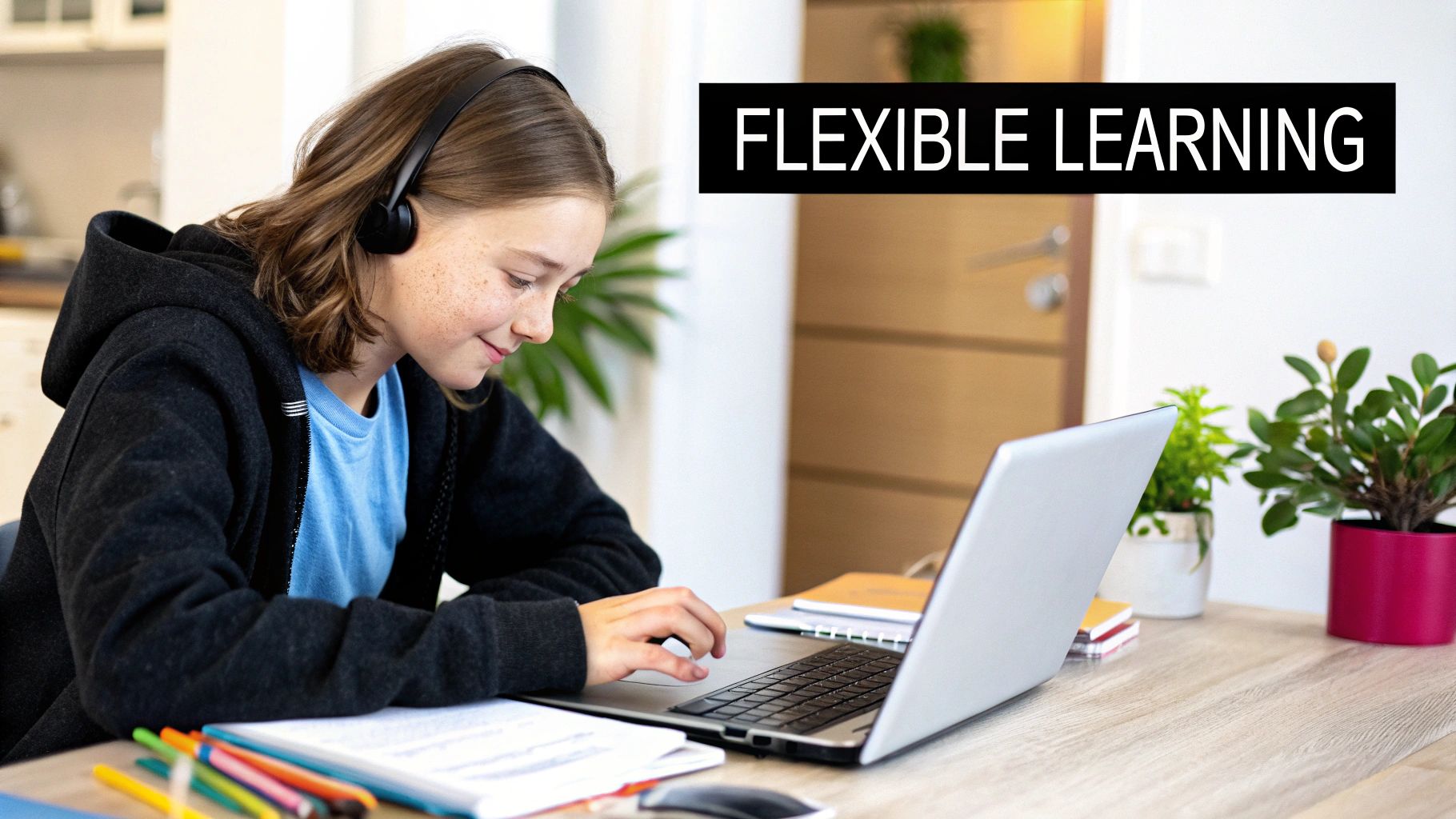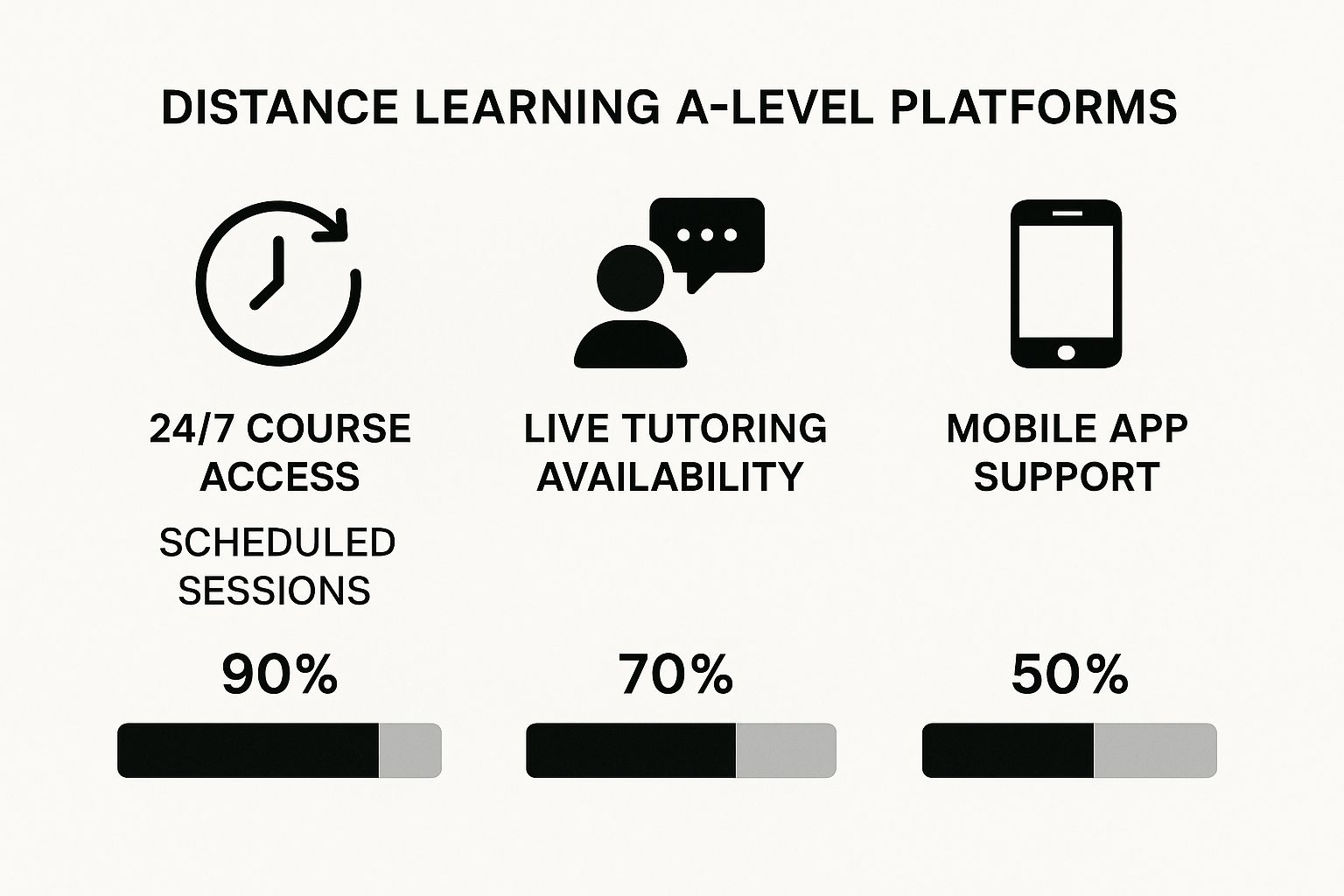Choosing the right A-Level path is a monumental decision, one that genuinely shapes your child's future. It can feel like you're holding their dreams in your hands. For a growing number of families, distance learning A-Levels are no longer a niche alternative but a powerful, deliberate choice. This approach offers a flexible, student-centred way to earn the exact same qualifications as a traditional sixth form, but tailored to your child's unique needs and ambitions.
Is Distance Learning a Good Choice for Your Child?
The thought of your child studying for their A-Levels from home can bring a mix of emotions—excitement about the possibilities and, let's be honest, a knot of worry in your stomach. Will they be disciplined enough? Will they feel lonely? These are completely valid concerns that every loving parent considers.
But what if we reframe the question? Instead of seeing it as a compromise, think of it as finding the specific environment where your child doesn't just cope, but truly flourishes.
For some students, the traditional classroom, with its constant noise, social pressures, and distractions, is a source of real anxiety. Imagine a child like Maya, who loves biology but finds the bustling classroom overwhelming. She struggles to concentrate and is often too shy to ask questions. A quiet, focused home environment can be the key that unlocks her academic potential. It allows her to concentrate deeply on complex subjects without the emotional drain of navigating a busy social scene, making study time far more productive and much less stressful.
Empowering a Balanced Life
Think about the talented young athlete, like Liam, who trains for hours each day, dreaming of a future in his sport. Or the gifted musician, Chloe, preparing for her next big audition. For them, a rigid school timetable can feel like a barrier, forcing them to choose between their passion and their education. Distance learning dismantles that barrier, offering the flexibility they need to chase their dreams without having to sacrifice their future. Their learning schedule adapts to them, not the other way around.
This model also fosters crucial life skills that universities and future employers absolutely love to see:
- Self-discipline: When a child learns to manage their own time and meet deadlines, they build a sense of responsibility that is deeply empowering.
- Proactive communication: Without a teacher physically in front of them, they learn to actively reach out to tutors, a skill that builds confidence and self-advocacy.
- Resourcefulness: They become brilliant at seeking out information, a skill that will serve them for the rest of their lives.
A Valid and Recognised Path to Success
At the end of the day, distance learning for A-Levels is a structured, supported, and fully recognised route to higher education. It's a weight off your shoulders to know that this flexible alternative allows students to study full A-Level courses remotely, usually over two years, with all the materials and tutor support they need.
Students complete the same AS and A2 components as their peers in physical schools and sit their exams at authorised centres to gain their qualifications. It’s not a shortcut; it's just a different, equally valid, path to the same destination.
For a deeper dive into what’s involved, our guide on online A Levels in the UK provides a really thorough overview. By putting your child's well-being and unique learning style at the heart of the decision, you can confidently choose the path that will best set them up for success.
A Week in the Life of an Online A Level Student

So, what does studying for your distance learning A Levels actually look like day-to-day? Forget the ringing school bells and rigid timetables; it's a completely different world. Let's walk through a typical week with a student we'll call Alex, who is studying Chemistry, History, and English from home.
Alex's week is built around their own rhythm—not a school's. They tackle their subjects when their energy is highest, weaving study around other commitments. This isn't about slacking off; it's about smart, focused learning that respects their natural flow.
Crafting a Flexible Schedule
Monday morning, Alex, who is a real morning person, decides to dive into Chemistry. They log into their learning portal, pull up a pre-recorded lecture on organic compounds, and get to work. The best part? They can pause, rewind, and re-watch tricky explanations until they click. There's no fear of looking slow or holding up the class—just pure, uninterrupted focus.
Later, they move on to a set of practice problems. When a particular equation proves stubborn, Alex doesn't have to wait with their hand up, feeling anxious. They simply post a question on the subject forum. A few hours later, a classmate has offered a helpful tip, and their tutor has added a detailed, step-by-step solution. The feeling of relief and clarity is immense.
This self-directed approach is the heart of online learning. It puts your child in the driver's seat of their education, building a powerful sense of ownership that boosts their confidence.
By managing their own learning schedule, students aren't just memorising facts for an exam; they are building the foundational skills of self-discipline and time management that are essential for university and beyond.
Interactive Learning and Personalised Feedback
Come Wednesday afternoon, it's time for a change of pace. Alex logs into a live History webinar on the causes of the Russian Revolution. This isn't a passive lecture; it's a dynamic, interactive session. They use their microphone to ask the tutor a question about propaganda and then jump into a virtual breakout room to debate different viewpoints with a small group of classmates.
The session is buzzing with ideas, proving that deep academic discussion can thrive online. It’s a brilliant way for your child to connect directly with tutors and other students who are just as passionate about the subject, making them feel part of a real academic community.
Later in the week, Alex is drafting an English literature essay. Once it's ready, they upload it to the portal. But what comes back isn't just a grade with a few red marks. Instead, their tutor sends a personalised video feedback file. Alex watches as their tutor walks them through the essay, praising strong points and gently explaining how to make the analysis even stronger.
This kind of direct, personal guidance is a game-changer. It feels less like a correction and more like a one-on-one tutorial, offering specific, encouraging advice that Alex can use straight away. That feeling of being seen and supported is priceless.
It’s this blend of independent study and rich, supportive interaction that truly defines the experience of distance learning A Levels. Alex isn’t just passively receiving information—they are an active participant in their own education, building skills that will set them up for life.
Comparing Online Study with Traditional Sixth Form
Deciding between distance learning A Levels and a traditional sixth form isn’t just about timetables and textbooks; it’s about finding the right environment for your child to flourish. The energetic, social buzz of a college campus is perfect for some, but for others, it can feel like trying to study in the middle of a crowded train station. This choice really comes down to understanding your child’s personality and what helps them feel confident and ready to learn.
For the student who thrives in peace and quiet, the ability to study from home is more than just a convenience—it's a game-changer. Imagine them finally being able to get to grips with complex topics like calculus or Shakespearean literature without the constant background chatter and social pressures of a busy classroom. This focused space allows them to think deeply and absorb information at their own pace, making study time a calm, productive experience instead of a source of stress. It can be the difference that turns "I can't do this" into "I finally get it!"
Finding the Right Balance for Your Child
The flexibility of online learning is also a lifeline for students juggling other serious commitments. Think of a dedicated gymnast who trains 20 hours a week or a promising young actor running to auditions. A rigid school schedule makes it incredibly difficult to balance these passions with A-Level studies, often forcing a heartbreaking choice between them.
With distance learning A Levels, that conflict simply vanishes. Their education is built around their life, not the other way around. They can tackle a physics lesson after a morning training session or revise for a history exam from a hotel room before a big performance. It’s not about compromising on their education; it’s about creating a pathway that honours every part of who they are, bringing a sense of relief and possibility.
This infographic breaks down some of the key differences you'll find with online learning providers.

As you can see, online providers are built from the ground up to offer on-demand access and flexible support, catering to students who need an academic schedule that truly works for them.
Choosing the Right A Level Path for Your Child
To help you weigh up the options, we've put together a simple comparison. As you read, think about which column resonates most with your child's personality and needs.
| Feature | Distance Learning A Levels | Traditional Sixth Form College |
|---|---|---|
| Learning Pace | Self-paced. Students move through material as quickly or slowly as they need, ideal for mastery learning. | Fixed schedule. The whole class moves at the same pace, set by the teacher and the school calendar. |
| Environment | Quiet, focused home setting free from social pressures and distractions. | Busy, social, and structured environment with set break times and classroom dynamics. |
| Flexibility | Highly flexible. Study fits around other commitments like sports, arts, or health needs. | Rigid timetable. Students must attend classes from roughly 9 am to 4 pm, Monday to Friday. |
| Social Interaction | Based on shared interests in online forums, live classes, and clubs. Encourages local community involvement. | Built-in daily social life through classes, lunch breaks, and school-organised events. |
| Teacher Support | On-demand support via email, messaging, or scheduled one-to-one calls with subject-specialist tutors. | Available during set class times, scheduled meetings, or parents' evenings. |
| Independence | Fosters strong self-discipline, time management, and personal responsibility—excellent university prep. | Provides a more structured, supervised learning path that guides students through their daily routine. |
Ultimately, there's no single "best" option—only the best option for your child. Reflect on their learning style, social needs, and personal goals to make an informed choice that feels right in your heart.
Redefining Social Interaction
One of the biggest worries parents have is the social side of things. It’s true that a traditional college has a ready-made social scene, but that doesn’t mean online students are left on their own. In fact, their social interactions are often far more intentional and meaningful.
Online communities for distance learners are vibrant and engaging. Students connect during live webinars, work together on collaborative projects, and chat in subject-specific forums, bonding over a genuine passion for what they're learning. Imagine your child finding a friend who lives 200 miles away but shares their exact passion for 18th-century poetry. They build friendships with peers from all over the country—and sometimes the world.
The goal is to choose a path that aligns with your child's character and ambitions, empowering them to succeed in an environment that feels supportive, builds their confidence, and respects their individual needs.
What’s more, the time saved from the daily commute can be reinvested into their local community. They can join a local theatre group, volunteer for a cause they care about, or get a part-time job. These real-world experiences build maturity, confidence, and a different, often more varied, set of social skills than those developed purely within the school gates.
How to Choose a High-Quality Learning Provider

Choosing a provider for your child's distance learning A Levels is without a doubt the most critical decision you'll make on this journey. This one choice has the power to shape their entire experience, from their day-to-day confidence right through to their final grades. It’s an investment not just of money, but of trust and your child's future.
If you’re feeling a bit lost in a sea of options, that's completely normal. The trick is to look beyond the slick websites and flashy brochures. You need to ask the tough questions—the ones that reveal what truly matters for your child's learning and well-being. This isn’t about just buying a course; it's about finding an educational partner you can rely on to care for your child as you do.
A big piece of the puzzle is how well they use technology. Their grasp of effective technology integration strategies will directly impact how engaged your child is. A clunky, outdated platform can quickly turn learning into a frustrating chore, but an intuitive, modern system makes studying feel seamless and even exciting.
Vetting Tutors and Support Systems
The quality of the tutors is simply non-negotiable. Don’t be afraid to dig deep here. Are the tutors qualified, experienced teachers who are experts in their subjects, or are they just forum moderators? You need to be certain that the person guiding your child through complex topics can genuinely inspire and explain things clearly.
Just as important is the kind of support on offer. For some students, a quick email response is all they need. But for a child who learns best by talking through a problem, access to scheduled one-to-one video calls is absolutely vital. Imagine the relief for a student struggling with a tough maths concept being able to see their tutor work it out live on screen. That personal connection can be the difference between feeling stuck and feeling truly supported.
Your child's education is too important for assumptions. Ensure any potential provider offers transparent, verifiable proof of their credentials and a support structure that genuinely meets your child's needs.
Accreditation and Authentic Reviews
Official accreditation is your stamp of quality assurance. A legitimate provider will be approved by official UK exam boards like AQA, Pearson Edexcel, or OCR. This guarantees that the curriculum is current and that the qualification your child earns will be recognised by every university. If a provider is vague about their accreditation, treat it as a major red flag.
Finally, while testimonials on their site are a good start, learn to read between the lines. Seek out detailed, independent reviews that talk about specific aspects of the course—things like the quality of feedback on assignments or how responsive the tutors were. Look for stories from parents whose children were in a similar situation to yours. Vague, overly glowing reviews can sometimes be less reliable than those that offer a more balanced, heartfelt picture.
Here are the critical questions to ask any potential provider:
- Tutor Qualifications: What are the specific qualifications and experience levels of your tutors?
- Support Channels: What methods of tutor support are available (email, phone, live video), and what are your typical response times?
- Platform Usability: Can we get a demo of the online learning platform to see how user-friendly it is?
- Accreditation: Which official UK exam boards are you accredited by?
- Exam Support: How exactly do you help students find an exam centre and register as a private candidate?
Asking these direct questions will give you the clarity you need to make a confident, informed decision and ensure your child is in the best possible hands.
Navigating Exams as a Private Candidate
The thought of final exams can be stressful for any student, and as a parent, you feel that stress right alongside them. When your child is learning from home, you might have an extra layer of questions. How do they actually sit their A-Levels if they aren’t at a physical school?
It’s simpler than you might think. Your child will be registered as a private candidate.
This just means they’ll sit their official exams at an approved exam centre, even though they’ve studied the course material independently. The A-Level certificate they receive will come from the same official exam boards—like AQA or Pearson Edexcel—and will look exactly the same as one earned at a sixth form college. There is absolutely no difference.
This is a really important point to remember: a qualification earned through distance learning A Levels holds the exact same weight and value with universities. Your child’s hard work leads to a nationally recognised qualification that is accepted and respected by top institutions everywhere. Knowing this can take a huge weight off your mind.
Proving Success Through Results
One of the biggest worries parents have is whether online students can really achieve the top grades. The answer is a clear and resounding yes. The academic standards are identical, and success comes down to the student's own effort and the quality of support they get from their learning provider.
Just look at the recent UK A-Level results. They show that top grades are achievable for everyone, including online learners. In one recent year, for example, 9.3% of all students achieved the highest A* grade, while the most common grade awarded was a B. These figures blend results from every kind of learning environment, proving that online students are competing on a level playing field. You can explore more about UK A-Level result trends on Statista.com.
The path to an A-Level certificate may be different, but the destination is the same. Universities value the qualification, not the building where the learning took place.
A good provider should offer dedicated support to help you find and register with an exam centre. They’ll guide you through the paperwork and deadlines, taking the stress out of the logistics so your child can focus entirely on their revision. The whole process is designed to be as smooth as possible, letting you breathe easier.
For families considering this flexible educational route, it’s reassuring to know the outcomes are just as strong. If you’d like to understand more about the structure of the courses themselves, you can read our detailed guide on A-Level distance learning. Ultimately, this approach empowers your child to achieve their full academic potential on their own terms, with their hard-earned grades opening doors to the future they deserve.
Creating a More Inclusive Path to Education

For many families, education feels like a rigid system their child is expected to slot neatly into. But what happens when that system just doesn't fit? What if education could adapt to the child, instead of the other way around? It's a question that keeps many parents up at night.
This is where distance learning A Levels become more than just a flexible option—they become a lifeline. They create a more inclusive and compassionate path to success for students whose needs aren't being met by the traditional school model.
Think of a student with a chronic illness who simply lacks the energy for a full day at a conventional sixth form. Or picture a family living in a rural area where the nearest college is a two-hour journey away. For these learners, online A Levels dismantle huge physical and geographical barriers, letting them chase their ambitions without sacrificing their well-being. It’s about giving them a chance to shine, regardless of their circumstances.
A Safe Haven for Learning
The emotional side of this is just as important. For a teenager struggling with social anxiety or trying to heal from a negative school environment like bullying, the calm and safety of home can be the very thing that allows them to focus and rediscover a love for learning. It can be the place where they finally feel safe enough to be themselves again.
This is the real promise at the heart of online education. It's a powerful tool for educational equity, offering a supportive, adaptable environment that helps level the playing field for every child. You can explore more about what inclusion in schools truly means and how it shapes a positive learning journey.
This focus on accessibility is vital. In a recent academic year, the retention rate for disadvantaged A-Level students was just 86.8%, a stark contrast to the 93.7% for their non-disadvantaged peers. This gap shines a light on the very real challenges some students face.
The structure of distance learning A Levels helps to bridge these disparities by delivering high-quality education to anyone, anywhere.
By putting the individual first, we create an environment where a child’s unique circumstances are seen not as obstacles, but simply as part of their story. Education should empower, not overwhelm.
Ultimately, this approach ensures that a bright future isn't limited by a postcode, a health condition, or social pressures. It’s about building a system where every student feels seen, supported, and capable of reaching their full potential.
Your Questions About Online A Levels Answered
Stepping into the world of online A Levels can feel a bit like exploring uncharted territory, so it's completely natural to have questions. Let's walk through some of the most common queries we hear from parents, putting your child's experience at the heart of every answer.
How Do UCAS Applications Work?
This is a big one, and it's reassuring to know the UCAS process is exactly the same for online students as it is for their peers in traditional schools. Your child's chosen provider will give them a unique buzzword that links their application directly to the institution.
Our expert tutors provide the all-important academic references and predicted grades, making sure their application is just as compelling and competitive as any other student's. They will champion your child, highlighting their strengths and potential to universities.
What About Social Connections?
While they won't be bumping into friends in a physical hallway, online students build connections in a much more intentional way. Picture your child in a live webinar, animatedly debating a topic they're passionate about with peers who share that same enthusiasm. You'll see their face light up in a way you haven't seen in a while.
They form real friendships in subject-specific forums and virtual clubs, bonding over shared interests rather than just happening to be in the same building.
This way of socialising often leads to deeper, more meaningful connections. It also frees up time for them to join local sports clubs or volunteer, building real-world confidence and a diverse friendship group beyond the digital classroom.
Of course, a smooth online learning experience hinges on a reliable internet connection. If you're dealing with frustrating Wi-Fi dead zones at home, it’s worth looking at the best way to improve home Wi-Fi coverage. A stable connection ensures your child can always connect with their classes and classmates without any interruptions, which is one less thing for you to worry about.
At Queens Online School, we provide a fully accredited, supportive, and engaging environment for your child to achieve their A Level goals. We understand the hopes you have for your child, and we're here to help them succeed. Discover how our live, interactive classes and dedicated tutor support can unlock their potential. Learn more about our online A Levels.

